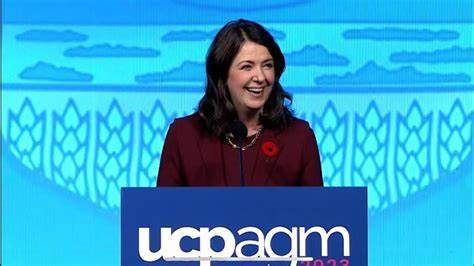In the heart of Alberta, nestled within the boundaries of the Chestermere-Strathmore riding, a historically staunch supporter of the United Conservative Party (UCP) and the preceding Wildrose Party, a simmering concern brews. With the UCP leaning further to the right than ever before, residents are left wondering: “Are we getting what we voted for?”
At the recent UCP convention in Calgary, members voted with near unanimity on several hard-right policy resolutions, such as refusing to house trans women in women’s prisons and requiring parental notification if a child wants to change their pronouns. Similar policies have already ignited controversies in New Brunswick and Saskatchewan.
Further, the party has shown keen interest in eradicating diversity and inclusion offices at tertiary institutions, banning safe drug consumption sites, and eschewing electronic vote tabulators due to suspicions of electoral manipulation.
These proposed policies represent a stark departure from established provincial norms. If Premier Danielle Smith were to heed these recommendations, it would signal a massive paradigm shift. However, Smith, who took over from Jason Kenney, has played down these resolutions, emphasizing that the government serves all Albertans. While she promised to consult stakeholders outside the party’s base before any decisions, the rift between party hardliners and moderates seems to be widening.
The issue of parental rights in schools, particularly concerning transgender children, remains a focal point. While Smith alluded to the importance of parental rights in her leader’s speech, her intentions remain unclear. Saskatchewan and New Brunswick’s hardline stances have spurred significant backlash, resulting in political upsets and legal challenges.
Although Smith has voiced personal convictions supporting the LGBTQ community, the UCP’s unanimous stance on this matter suggests she might be compelled to act. However, she seems inclined towards a more tempered approach, striving to balance parental rights with the protection and support of children.
Many UCP grassroots supporters, some of whom have actively protested against gender identity discussions in schools, hold strong views on these issues. But there’s a rising concern: will the UCP’s far-right shift alienate its moderate base, especially in places like Chestermere-Strathmore?
History paints a cautionary tale for Smith. As the former Wildrose leader, she faced backlash in 2012 for not taking action against a candidate’s homophobic remarks. In 2014, a convention vote against LGBTQ rights further fractured the party. Today’s UCP, a merge between the Progressive Conservative Party and Wildrose, seems to be experiencing an exodus of its moderates. This year’s convention was marked by an overwhelming vote against so-called “woke” issues, while only a handful warned against potential discrimination.
This ideological shift is further underscored by the popularity of merchandise bearing slogans like “More Alberta, less Ottawa” – a clear nod to the two-decades-old Alberta firewall letter.
For Chestermere-Strathmore residents, it’s a waiting game. With an evolving political landscape and a party grappling with its identity, the real question is whether the UCP’s vision aligns with that of its constituents. If not, it could reshape the region’s political allegiance in upcoming elections.
Chestermere’s Political Crossroads: UCP’s Rightward Shift Sparks Reflection Among Loyalists

Is this the UCP Chestermere-Strathmore voted for, or is the party charting an uncertain path?
In response to Canada's Online News Act and Meta (Facebook and Instagram) removing access to Canada's local news from their platforms, Anchor Media Inc encourages you to get your news directly from your trusted source by bookmarking this site and downloading the Rogue Radio App. Send your news tips, story ideas, pictures, and videos to info@anchormedia.ca.









